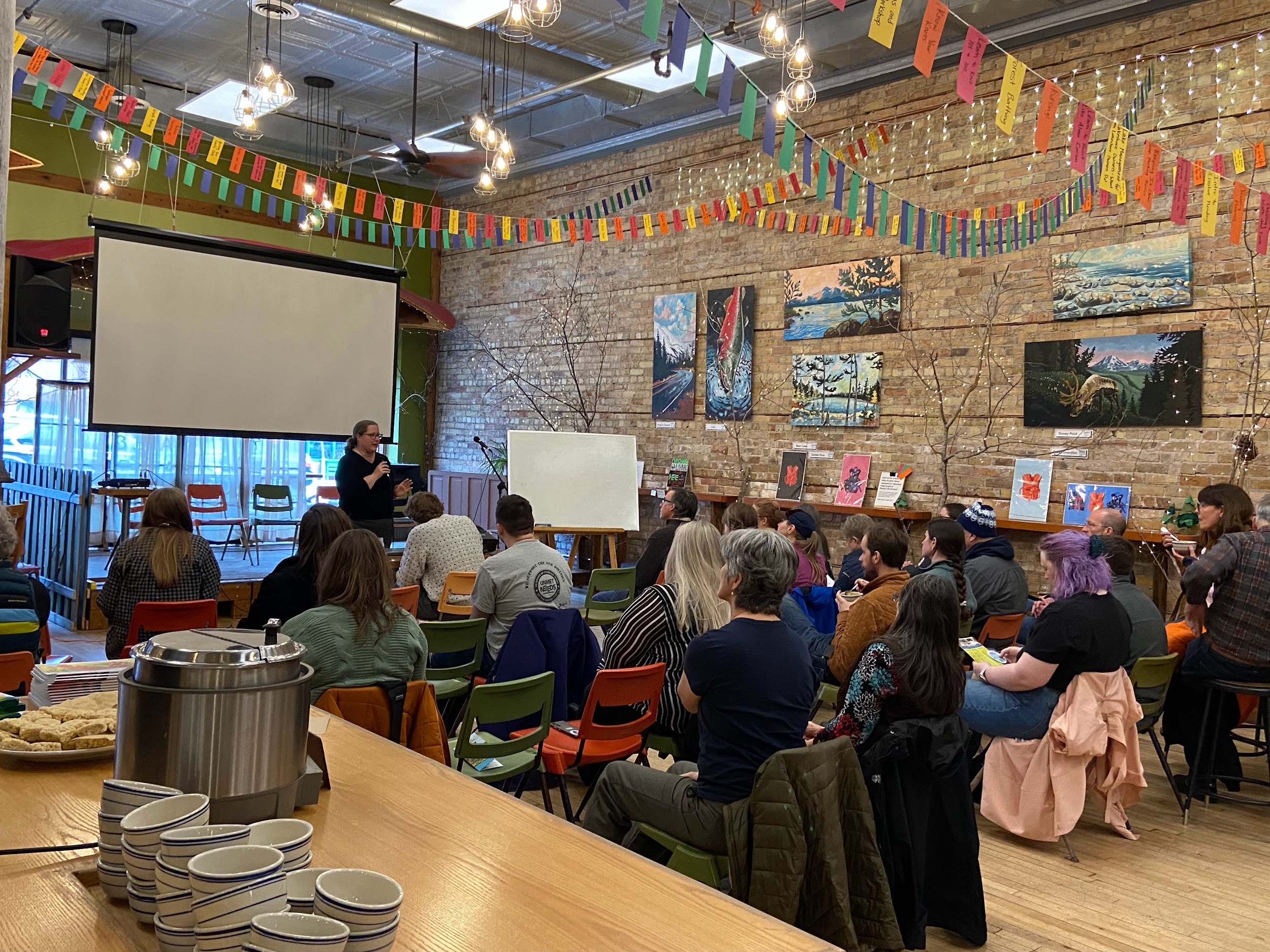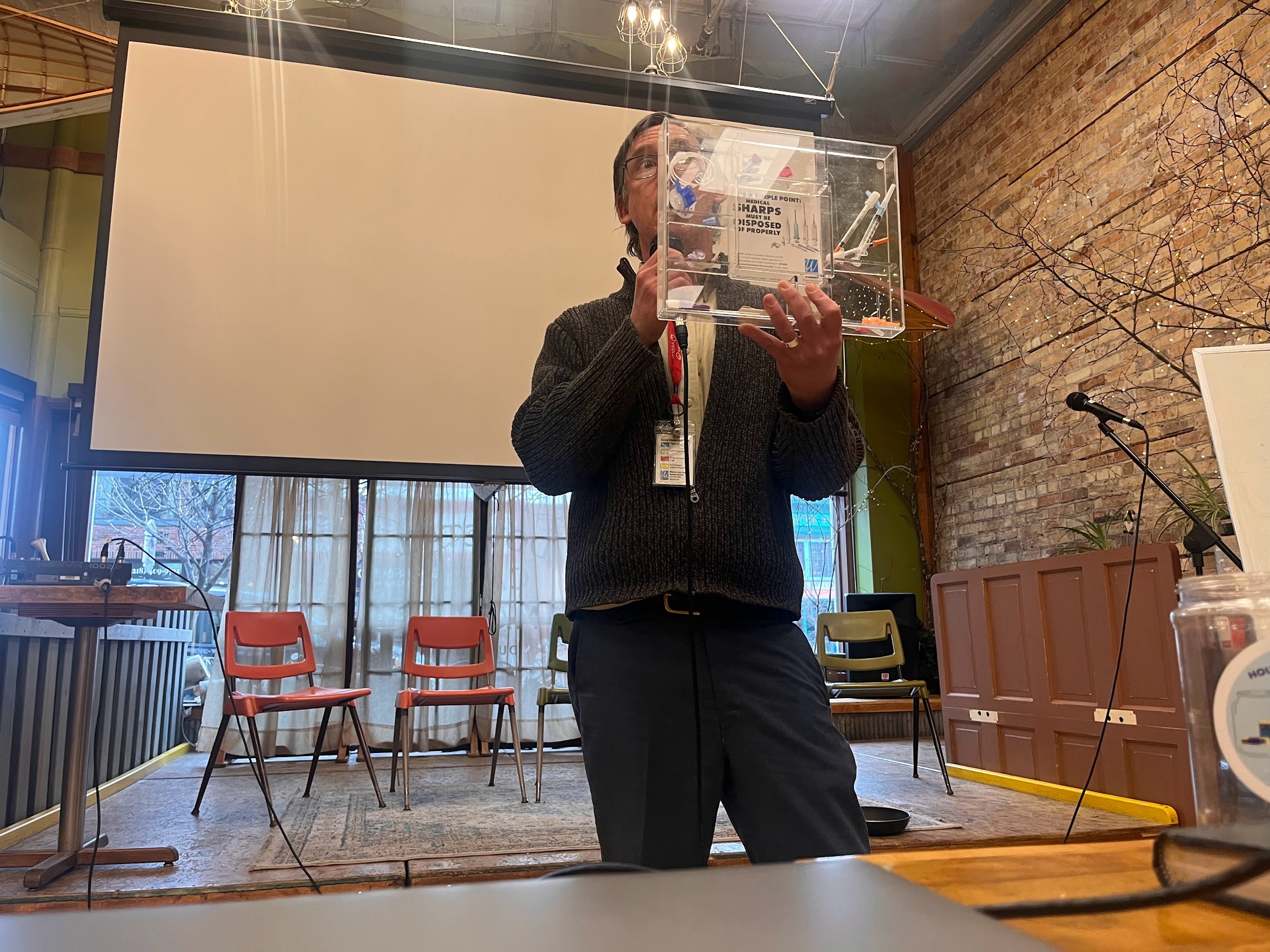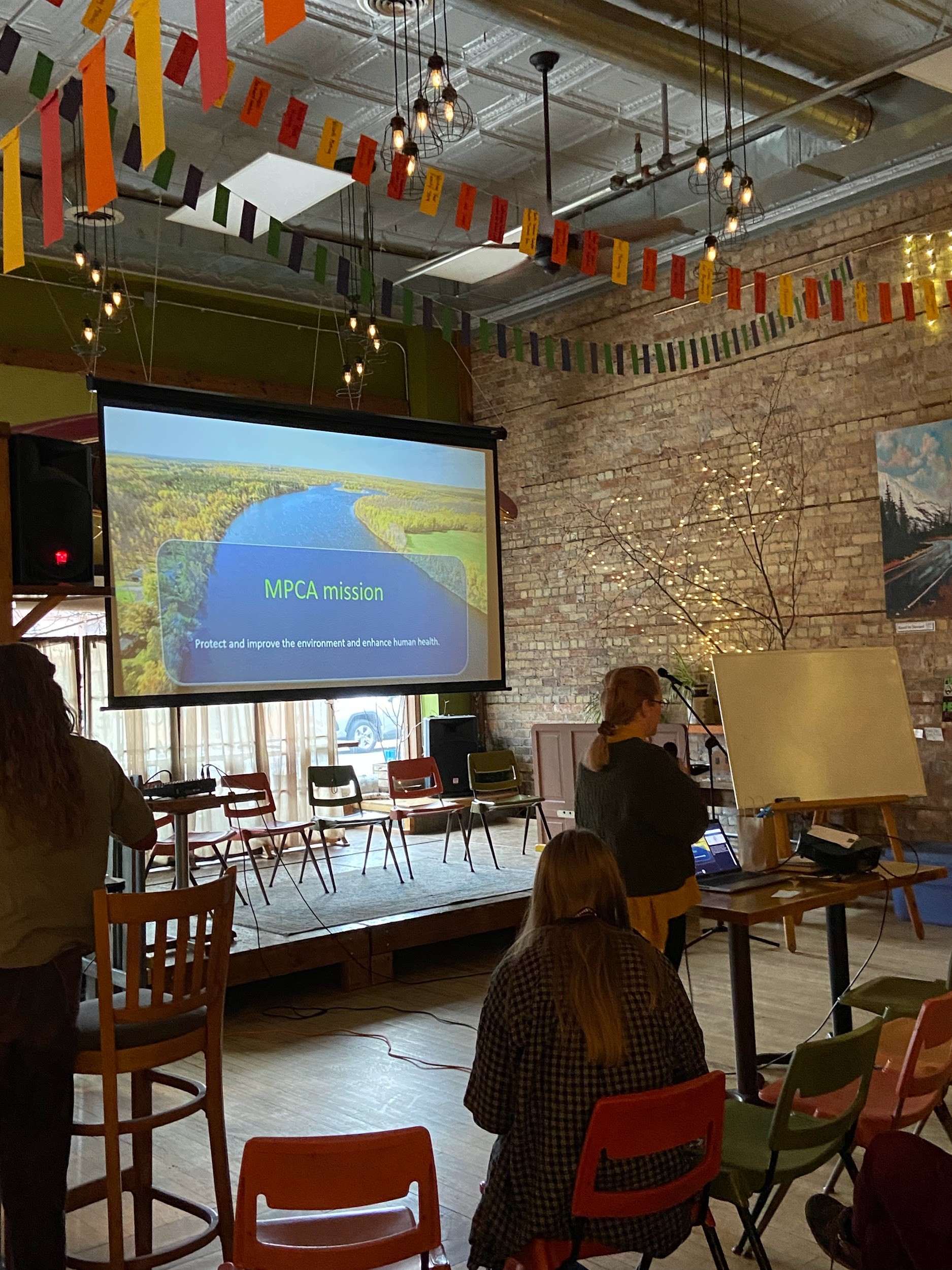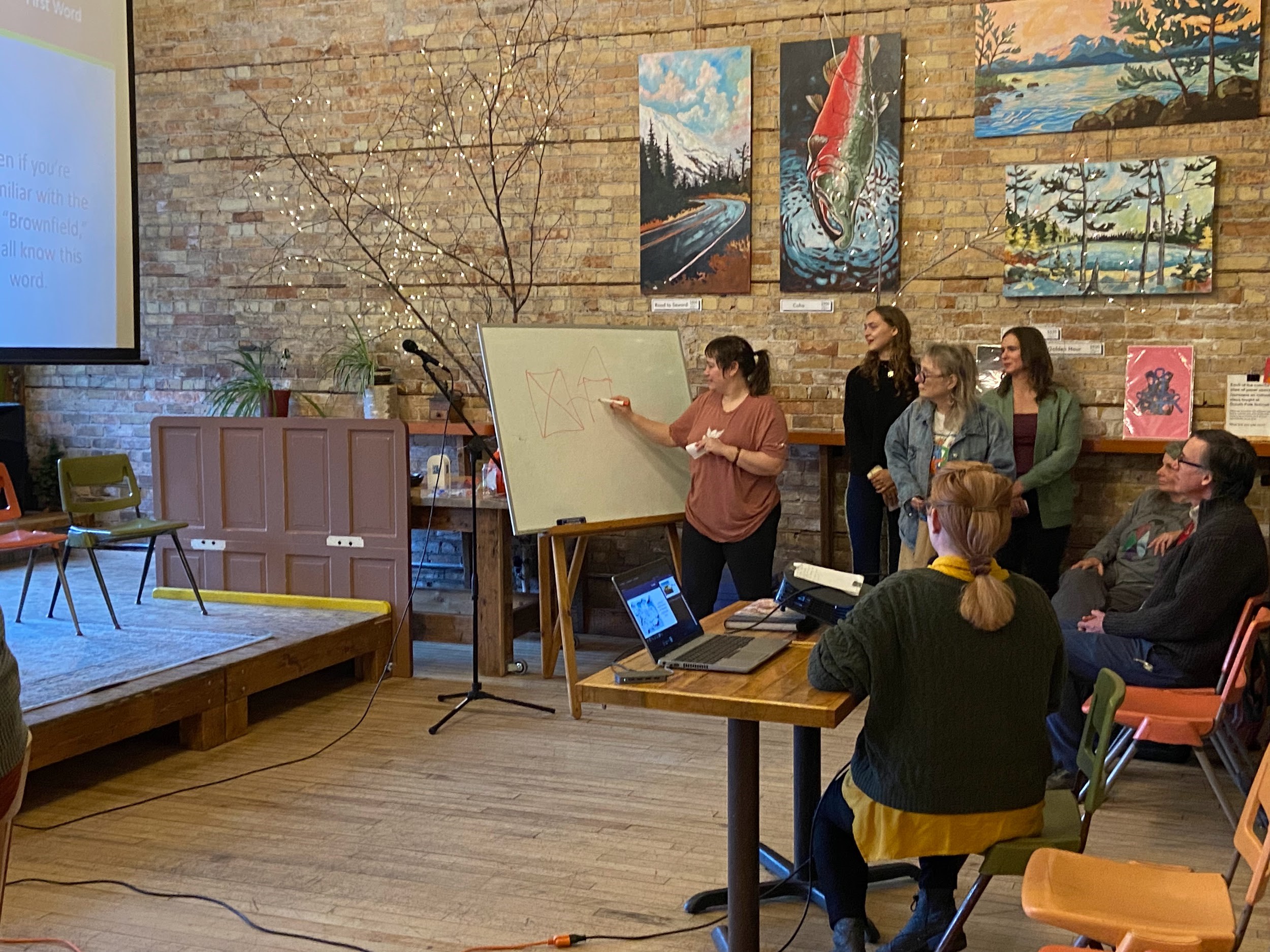Health, Equity and the Environment
At the April session of Sustainable Duluth, we talked about the intersection of health, equity and the environment. A wide variety of local changemakers joined us to discuss environmental justice, hazardous waste, brownfield sites, lead pipeline removal, extreme weather and more. Here's what you missed:

Jodi Slick is the founder and CEO of Ecolibrium3, leading the organization’s community resilience and sustainability work. Eco3’s work is centered on the Lincoln Park 156 community where human life expectancy is at its lowest in the state. Despite this, Lincoln Park is home to a Folk school, the oldest children's museum, and on the border of the largest freshwater estuary in Northern Minnesota. But, not unlike many cities in America, Lincoln Park is a functional food desert, meaning you may live across the street from a grocery store, but if you can’t afford to buy the food from there, you are still food insecure. functionally, food insecure areas are determined by 27 common items that should be available within a neighborhood. Out of the 27 items that should be able to be bought, Lincoln Park only has 9. In addition, less than 60% of households own a vehicle and many people between the ages of 15 and 65 have a disability. Additionally, Lincoln Park hosts a wastewater treatment plant, docks, and shipping lanes despite being considered a “dry” or “inland” neighborhood. Recently, 2.5 billion dollars of transportation investments have been made in Lincoln Park, despite most people in the neighborhood not owning a vehicle. Recently, the City of Duluth, in partnership with Eco3, secured a grant to rebuild West Superior Street during the large highway reconstruction in the neighborhood to make it safer for pedestrians and more sustainable. Learn more about that exciting project here.

Ryan Ihrke is an Environmental Program Coordinator at WLSSD, with responsibilities including outreach and education in the areas of Household Hazardous Waste, Pollution Prevention, Wastewater, Biosolids and WLSSD’s educational tours program. Ryan asked the question: “why do we create stuff that we don’t know how to get rid of?” As a society, we should think about the end of life of the things that we use and buy. Not everything can just end up in the trash. Also: when batteries are not properly disposed of, they can start fires. If you are trying to dispose of old batteries: get a container, tape the battery terminals with clear tape and bring them to WLSSD Hazardous Waste Facility to be sorted safely. Alkaline batteries will be thrown away due to limited recycling opportunities, but lithium batteries will be recycled! If you come across a needle or sharp that you do not feel comfortable disposing of it yourself, call the City of Duluth hotline (218-730-4001). Calls will be answered 24/7 and a volunteer will respond to the location. Learn more about WLSSD’s programs here.


Crystal Mogensen serves as the Outreach Planner for the Minnesota Pollution Control Agency’s Brownfields Outreach Program, collaborating with a diverse range of stakeholders. Her focus includes engaging with community organizations, local units of government, tribal entities, rural areas and communities affected by environmental justice inequities. She provided a background on brownfield sites, which are underutilized properties whose redevelopment is hindered by real or perceived environmental dangers. Contaminant exposure, safety risks, social and economic impacts, environmental health risks are all linked to brownfields. Crystal also gave a background on environmental justice areas , which are neighborhoods at greater risk of being exposed to pollutants (you can learn more at the LINK TO MPCA ENVIRONMENTAL JUSTICE MAP/PAGE) . You can also find brownfields in your area by checking the ‘What’s in My Neighborhood’ tool. Stay informed on what the MPCA is working on here.
Kelly Bruels has been with St. Louis County Public Health for over 10 years, with a majority of that time being spent with various home-visiting programs. One of her current responsibilities is the Asthma Home Visiting program, with a focus on individuals aged 0-18 with poorly controlled asthma. She works to get supplies in the home to mitigate triggers. To improve air quality in the home, Kelly recommends making sure your furnace is well kept, having high quality air filters, vacuuming often, and using air filters. Outside of the home, air pollution is a common trigger. With increasing hot summers and dry winters leading to fires, ozone levels and air particulate matter are increasing. For more information on the Asthma Home Visiting program, contact Kelly at 218-725-5212 or bruelsk@stlouiscountymn.go.
Joe Moore is the Warning Coordination Meteorologist at the National Weather Service in Duluth, MN, responsible for managing the office's hazardous weather preparedness, outreach, and education activities across northeast Minnesota and northwest Wisconsin. Joe works closely with partners in Emergency Management and others at the federal, state, local, and tribal government level as well as community groups to help achieve the National Weather Service's vision of a Weather-Ready Nation. Joe works to get information out to residents and adjust communication methods by learning from community partners. Joe and his team look at public health data to see the impacts of heat and how to best communicate that risk to the public. The National Weather Service partners with others, like MPCA meteorologists, to understand wildfire-related air pollution. Learn more here.
Cynthia Falconer is the Lead Program Coordinator for Public Works & Utilities at the City of Duluth. Her career with the City started in 2016 at ComfortSystems and over the last two years she has focused on developing the Lead Removal Program and lead abatement. The Lead Removal Program focuses on mitigating exposure to lead from the drinking water in our water system and is guided by the EPA and MN Dept of Health. The program is focused on developing an inventory of lead service lines, reducing lead through our water pitcher program, corrosion control, and ultimately replacement of all lead service lines in the City. Duluth has amazing drinking water, but when lead service pipes are present in a private residence, it can contaminate the water as it is brought from the street pipes into the home. Homes built before 1946 often used lead pipes. The City is still creating the lead pipe inventory, which was an important first step for the program. Service lines of pipes are dual-owned by the city of Duluth. There are 30,000 service connections in Duluth, and 7,700 of those have been confirmed to be lead. Once the inventory is complete, they predict finding up to 10,000 lead connections. The good news? In 2024, the program expects to replace up to 600 services in Gary New Duluth and Lincoln Park. Learn more here.
Melissa Hellrud is the Director of Workforce Programs at Community Action Duluth, a nonprofit organization that strives to eliminate poverty and create opportunities for low-income people. In this role, she oversees various programs that provide education, training, and support to help participants gain and retain employment, increase their income, and achieve self-sufficiency. She also provided lead mitigation work which includes blood drawn tests for children 6 and under, and pregnant women which are the highest impacted groups for lead poisoning. Lead impacts brain development in children. Pregnant women who ingest high levels of lead have difficulties with birth and their infants can have deformities due to lead. People most often ingest lead through ceiling dust and old paint. Community Action Duluth can help with lead mitigation in home, especially where a child has tested for high levels of lead. This mitigation work is done upfront but it is about providing safety for households until the root of the issue can be addressed. Learn more here.
Caroline Torkildson is a board member and outreach committee lead for Starry Skies North, the Minnesota Chapter of DarkSky International, an organization that promotes restoration of the nighttime environment by creating more dark sky designated places, building awareness of light pollution, and promoting the appreciation of the night sky. She is an amateur astronomer who lives in Duluth, and also has a home in Cook County. DarkSky International is concerned about the effects of light pollution on the environment, ecosystems and human health. Candles were invented 3,000 years ago, electricity only 150 years ago, LEDs in the early 2000s. We are only starting to understand sleep disruption due to human circadian rhythms being thrown off by light pollution. Learn more here.
Harm Reduction Sisters is composed of a dedicated team of volunteers, staff, and community members who collectively create a network of harm reduction education, access, and resource sharing across Northern Minnesota. Services include the distribution of sterile injection supplies, overdose education, and naloxone to communities in Northern Minnesota. Harm Reduction Sisters provides a feminist response, utilizing innovative harm reduction principles and practices to address the gaps that exist for people who use drugs and experience trauma. They address HIV, Hepatitis C, Syphilis, and other disease outbreaks with their primary work being the distribution of products that are safer for drug use rather than restricting use. Harm Reduction Sisters provides clean syringes, tourniquets, boilers, glassware, smoking supplies, hygiene kits, wound care kits, and more. They encourage active addicts to shift drug use from skin injection to smoking/inhalation by providing smoking supplies. Most workers at Harm Reductions are experienced and know the love it takes to distribute these supplies and understand the need to provide medical supplies. They provide HIV, Hepatitis C, and Syphilis testing and have a skin health station for wounds. Many people do not feel comfortable with traditional healthcare providers but they will trust local organizations such as Harm Reduction Sisters for support. Learn more about the services provided here.

Do you still have questions after this session? Come to our next session which will dive into the importance of food systems, pollinators, farming and more on Thursday, May 16th, 6-7:30pm!




